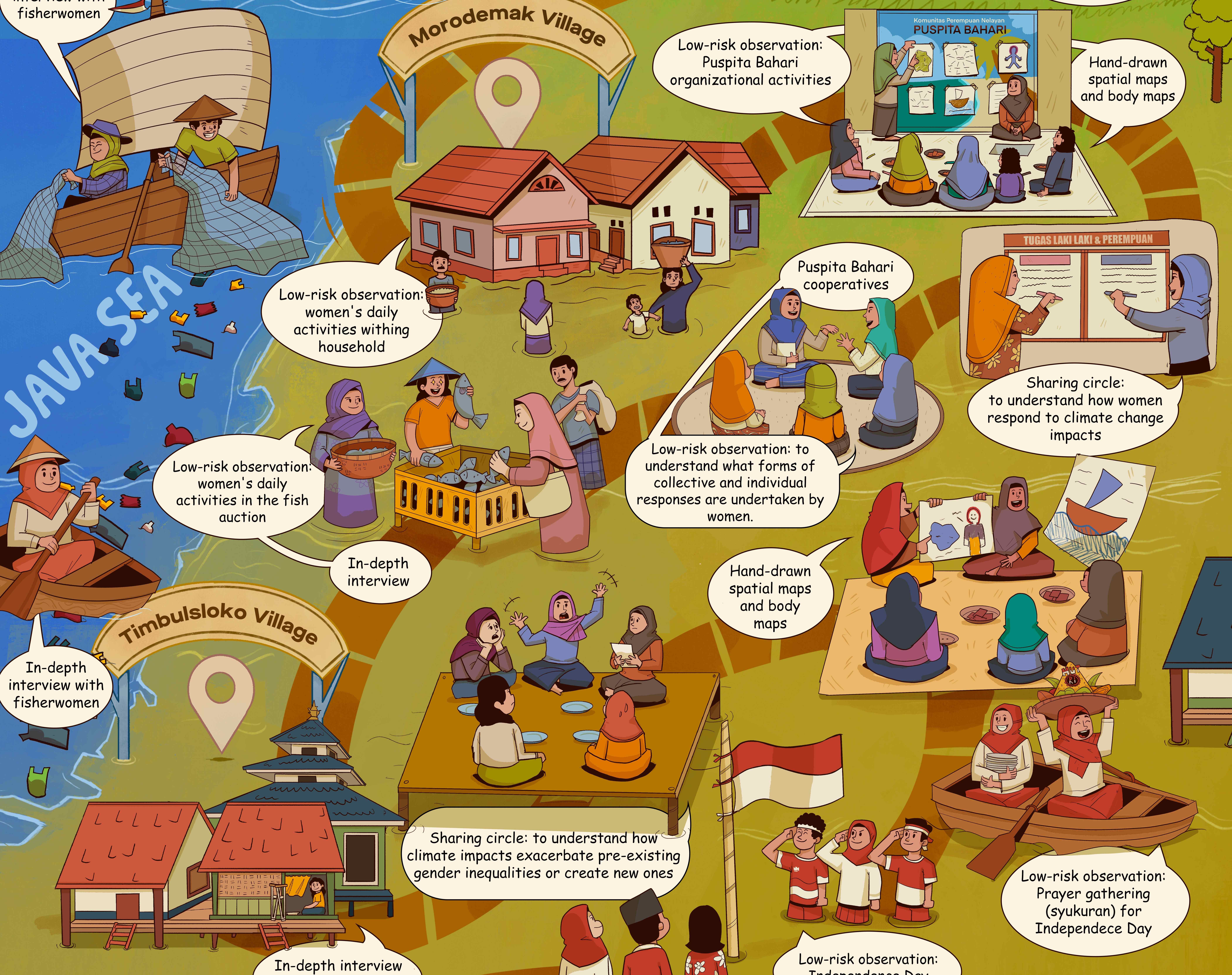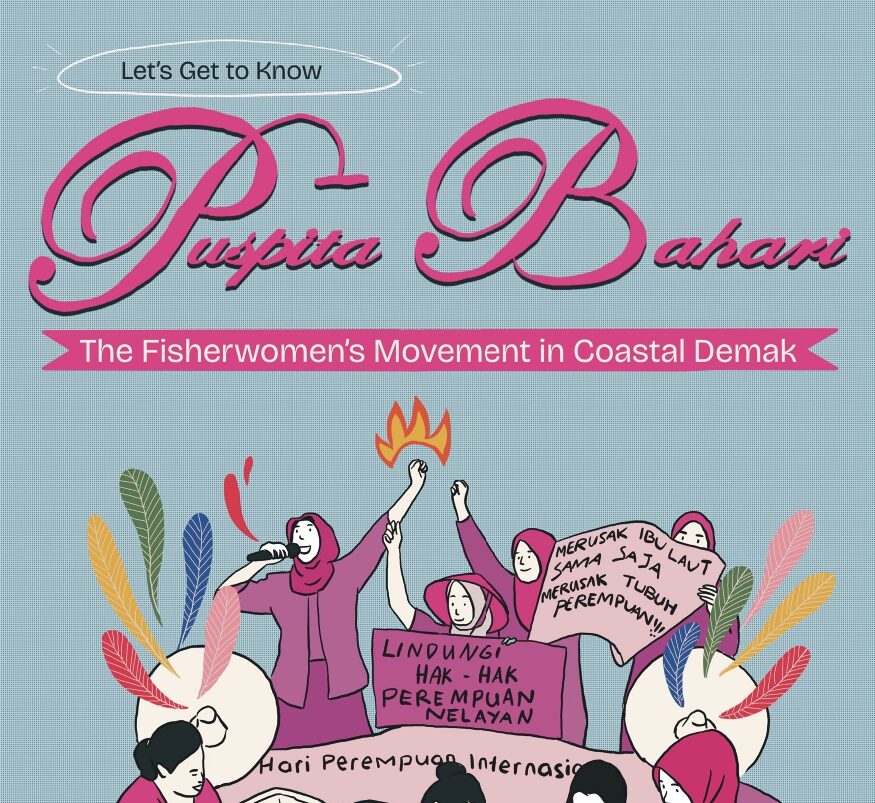
The GENERATE project recently held its first call for creative work and is now very pleased to announce the results. Announced in August, Climate and Gender (In)Justice in the City sought artistic and creative submissions in any form or medium that addressed the themes of climate change, environmental issues, gender, and urbanism in Uganda or Indonesia.
The call garnered considerable interest. 130 entries were received, from poetry and photographs to collages and performances. Applicants were similarly diverse in experience and interests, from established artists in both countries to young climate activists keen to use the arts as a way to amplify calls for climate justice.

The work were considered by a team of guest judges and the GENERATE team. Entries were considered on the basis of their originality, aesthetics, concept, and messaging. Far more entries were received than could be accepted, and in total 30 pieces were selected: a winner, two runners-up and twelve commended entries from each country. All will be featured on GENERATE’s website.
The six judges brought a broad range of artistic and curating experience, as well as expert knowledge on climate change and its impacts. The Ugandan entries were reviewed by musician and Community Coordinator of Kampala art centre 32° East and Ugandan Arts Trust, Sandra Suubi, creative producer and Programme Manager (Creative Economy and Sub-Saharan Africa Arts) at the British Council in Uganda, Rasheeda Nalumoso, and Executive Director of the NGO African Centre for Trade and Development, Susan Nanduddu. Meanwhile, the Indonesian entries were considered by painter and Founder of Jejer Wadon, a community that focuses on women’s issues Dewi Candraningrum, a gender activist and vocalist-songwriter for Tika & the Dissidents band, Kartika Jahja, and artist, curator and crafter Ika Vantiani.

Selected Submissions
Uganda:
- Winner: Davina Philimena Kawima
- Runner-up: Jim Joel Nyakaana
- Runner-up: Aida Namukose
- Commended Entry: Ann Grace Apiita
- Commended Entry: Nandyose Idah
- Commended Entry: Doreen Arinaitwe
- Commended Entry: Edgar Kanyike
- Commended Entry: Wasswa James
- Commended Entry: Egessa Dervin
- Commended Entry: Muramuzi Johnbosco
- Commended Entry: Mubiru Denis
- Commended Entry: Kevin Ssemanda
- Commended Entry: Agaba Solomon Peabo
- Commended Entry: Nath Niyitegeka
- Commended Entry: Benedict Hangiriza

Indonesia:
- Winner: Madam Seroja
- Runner-up: Fajar Zakri
- Runner-up: Myra Juliarti
- Commended Entry: Christabel Annora Paramita Parung
- Commended Entry: Farid Hamka
- Commended Entry: Ivy Londa & Dinar Bayu
- Commended Entry: Mama Atha
- Commended Entry: Firdhan Aria Wijaya
- Commended Entry: Gilang Widya Kartika
- Commended Entry: Himbar Andriyani
- Commended Entry: Margaretta Novianty
- Commended Entry: Achmad Dimas
- Commended Entry: Farrah Eva Nabila
- Commended Entry: Nurillah Achmad
- Commended Entry: Munir
Insights from Creative Work:
Congratulations to all those selected and a big thank you to everyone who submitted their work! All of the entries explored exciting and critical themes and questions on climate and gender justice in Ugandan and Indonesian cities. Work touched on the immediate and longer-term consequences of rising global temperatures, such as urban flooding or the environmental consequences of large-scale consummation and resource extraction. They also centred on where and by whom these consequences are felt, including different minority groups or how different experiences can be depending on if someone lives in a wealthy or poorer neighbourhood. Finally, a number of entries flagged creative efforts to try to adapt or mitigate climate change, either by rethinking fashion or the way homes are constructed in cities.
The winning entry for Uganda, Davina Philimena Kawima’s short story The Burnt-Out End of a Rainy Day, focuses on a young Ugandan women named Yago, who has moved to Uganda’s capital and largest city Kampala from a rural part of the country. It follows her daily routine, the impact upon her everyday life of increased rainfall and flooding, and explores how climate injustices are often gendered and impact already marginalised urban communities the most. As the author writes, “Kampala rain has little regard for month or season: it closes in like the proverbial thief in the night, no clouds in sight to announce its arrival. Its only intent seems to be to stuff itself, to kill, to destroy…”. The story impressed the judges and GENERATE team, and brings to life everyday impacts faced by urban residents in Uganda and beyond.
The winning entry for Indonesia is a monolog by Madam Seroja who highlights gender (in) justice in particular transwoman experiences dealing with climate change impact in one of the most densely populated slum areas in Jakarta, Kampung Duri. In her monologue, Madam Seroja touches upon difficulties trans women face, many of them have no option but working on the street as buskers. Climate change has a huge impact on their life as when there is flooding they cannot work or earn money, while at the same time they are often left out from various support or social assistance programmes. They also often choose to stay in their flooded house due to heteronormative norms in the society which make them feel uncomfortable staying at emergency shelters. As she said in her monologue “we are questioned for going to the women’s toilet, and (people are) suspicious if we go to the men’s toilet.” The monologue is very well written and performed as well as bringing about the experiences of a marginalized community in a slum area in the city of Jakarta facing the impact of climate change.
The two runners-up for Uganda were photographs which considered different ways in which climate change and environmental impact different women in cities. Jim Joel Nyakaana’s photograph, taken on a hot day in September 2021, shows a woman sitting on the back of a boda boda (motorcycle taxi) and raises questions about the differing ways people can mitigate heat stress. As he writes, “I felt the heat that day, and could feel the dilemma of this lady. She may be judged for almost undressing in public, yet people did not consider the unbear[able] heat caused by the gradual global warming that has cut across the world. While men can unzip or even remove their shirts during such seasons of heat, women are judged differently.” Aida Namukose’s photograph meanwhile highlights the placement of landfills and waste in Ugandan cities, the disproportionate impact this has on low-income women, and the health consequences many experience as a result of living near and working in these sites.
Indonesia first runner-up is a poem by Fajar Zakri called What on God’s Green Earth. His poem criticising human’s behaviour that has cost the earth and its natural ecosystem. Fajar said “The poem is abstract and laden with imagery for the very reason that I do, in fact, envision myself just being tossed off at sea when the time has come to depart from my flesh prison. So it dips in and out between that dreamy, fantastical setting and laser-sharp social critique.” Meanwhile Indonesia second runner-up is a jacket called Suit Me which was made under the label siji, a clothing line inspired by social and environmental issues. This work is made by Myra Juliarti which highlights multiple responsibilities and burdens faced by women both in domestic and public space. Myra wrote “Imagine doing all that double work (domestic and public), unfairly paid, and have no clean water during their period or while giving birth to their child. Or having no food on the table to serve their family due to lack of food source. Dry land, contaminated water caused by capitalism. An activities that exploited as many source as they can, whether it’s the environment or cheap labour for the sake of profit.”
Climate and Gender (In)Justice in the City demonstrates the ability and power of creative work to highlight existing and future problems, raise new questions and perspectives, and amplify the voices of individuals and communities that are all too often not heard in climate planning and policy.
From The Judges:
I felt humbled and blessed to be the national jury of GENERATE Leeds University on cities, gender, and climate change along with other two experienced and outstanding artists Ika Vantiani and Kartika Jahja. All of the artworks that were created are amazingly beautiful and leaves an invaluable impact on us as the juries. They were not only painting/drawing, song, visual arts, short stories, poem, collage, even art in sustainable fashion, and other incredible submissions. Not only does this competition let us gain a thoughtful insight into the artists’ engagement but they also make sure that the voice of gender and climate crisis resonate and widely appreciated. The most important point of all is that this connects and builds deeper relationships with our current crisis. This competition has an amazing way to let us invest our passion in art by channelling it to be part of the solution instead of creating more problems dealing with our current catastrophe. The Generate committee had received more than 50 submissions. All of the artworks were not easy to evaluate. In particular, we the jury ask ourselves: How does the artist direct our eye, and where does it linger? How does the artist use colour or sound or words to create depth, attract attention, or endow certain twist with particular significance or meaning? What specific forms does the work contain, and what do we think they mean? What message is being delivered in the artwork? Whose perspective is being projected? How it communicate to the audience/viewers? And other questions to reflect such as the originality/uniqueness, aesthetic quality (design, composition, color/tones), uniqueness of writing style, concept (gender and ecology), as well as voice. Picking the shortlisted, best 15, the runner ups, and best three was by far the toughest part for us. They help us realize that we have to give the awards to what we feel as the strongest and most powerful work. It is a priceless learning process for us too. The winning artworks have help to remind us every day of the importance of being responsible stewards of Planet Earth and champion of gender & ecological justice. We appreciate for all of your submissions. We congratulate to all of the winners!
Best wishes,
Surakarta, 28 October 2021
Dewi Candraningrum



